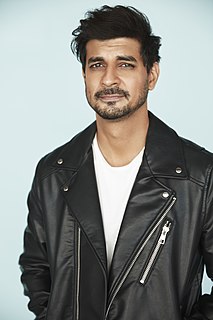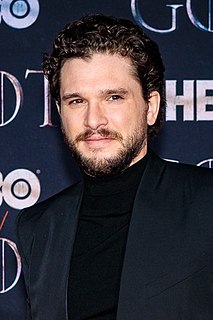A Quote by Sam Levinson
The way that I deal with actors as a director is I just talk to them forever before we even arrive on set.
Related Quotes
I don't want to be like the actor who rehearses everything in the bathroom, then comes to the set and carries on completely uninterrupted while the other actors tiptoe away. I'm so dependent on reacting to the other actors on the set, and to the director. I'm very responsive. I react. And I treasure the energy that reaction gives. I feed off that and work off that. I don't like to be too prepared, no. However we define too prepared, if I feel it's getting that way, then I'll back off. My line-learning is very special. I like to learn the dialogue of the whole film before I arrive.
I aspire to be an instrument of the director. I'm happiest like that. The stronger the director, the more I'm willing to give them. It's not just about admiration for their films, it's how they deal with you, and whether they get you or the way you work. If they don't, you better adjust your way of working to suit them. I want to work with people who are good at what they do, and people who are passionate. As you get older, you suffer fools less easily. That's why there's all those cranky character actors. I'm an exception. I'm a sweetheart.
To go into more specifics regarding actors, whether they're from Korea or the U.S., all actors know if they are loved by the director. When they feel that love from the director, they respond by giving a great performance on camera. Also, everyone on set - the crew, the actors - they were aware of the film's message and its broad theme, so these big issues were never discussed on set.
Before writing a single note of music, and even before the spotting session, I find it best to sit down with the director and just listen to him or her talk about the film - what they're trying to say, what they want the audience to understand or believe, and a thousand other similar questions. The director has most likely been living with the film for years before a composer is attached, and so the director's inclinations, desires, and understanding of the film are paramount.
Directing doesn't appeal to me. I'm much more in the world of ideas. My husband is a director, and I understand what it takes to direct. It's a skill set where you have to be able to talk to actors and understand them, and I don't. It's a very different way of being in the world, and I much prefer writing and producing.
Actors, I think, are all the same. Both Korean actors and American actors are all very sensitive people, and they are all curious to know what the director thinks of them and how they are evaluated, and they try to satisfy the director. And they like it if you listen carefully to their opinions and accept them.
Your actors need to trust you as a director, but normally, I think you just need to have an open communication between the actors and the director. I think the director needs to really paint his or her vision to the cast and let them know the kind of mood that he or she is making. I think that's very important.
The thing I was up against in documentary films - was trying to get non-actors to convincingly play themselves in a way I'd come to know before the camera started rolling. And many non-actors can't do that convincingly, even if they just have to play themselves - they can't be naturalistic. And I would always want to recreate something I'd witnessed them do or say, and it just would be incredibly difficult because of the fact they weren't actors.
I have my set rigged with the biggest sound system possible and have a mini jack for my iPod attached to my director's chair. I find playing music is a very direct way to communicate with actors and the crew, especially those crew members who are on the periphery of the set. I like dancing on set too, it's a good way to release tension.



































